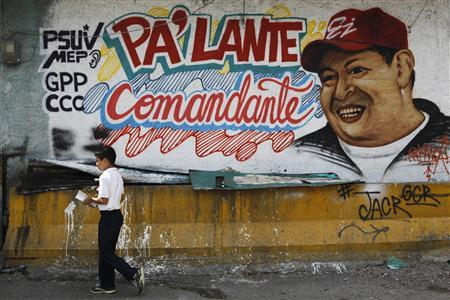Venezuela Postpones Chavez Inauguration

Venezuela will postpone the inauguration of President Hugo Chavez for a new term, scheduled for Thursday, due to health problems, the government said Tuesday.
It’s the latest sign that the socialist leader's cancer may be bringing an end to his 14 years in power.
The 58-year-old former soldier who has dominated his nation since 1999 has not been heard from since surgery on Dec. 11 in Cuba - his fourth operation since he was diagnosed with an undisclosed type of cancer in June 2011.
The delay has outraged opposition leaders who insist that Chavez must be sworn in before the National Assembly on Jan. 10 as laid out in the constitution he drafted himself, or temporarily step aside and leave an ally in power.
"The commander president wants us to inform that, based on his medical team's recommendations, the post-operative recovery should extend past Jan. 10," Vice President Nicolas Maduro said in a letter read to the legislature by National Assembly President Diosdado Cabello, Reuters reported.
"As a result, he will not be able to be present at the National Assembly on that date."
The letter said authorities would seek another date for the inauguration ceremony but did not say when it would take place, nor give any time frame for Chavez's recovery or his return from Havana.
Rather than being sworn in by the legislature, the president would take his oath at a later date before the Supreme Court, the letter said, as allowed by the constitution.
Government leaders insist Chavez is completely fulfilling his duties as head of state - even though official medical bulletins say he has a severe pulmonary infection and has had trouble breathing.
The government has called for a massive rally of supporters outside the presidential palace on Thursday, and allies including Presidents Jose Mujica of Uruguay and Evo Morales of Bolivia have confirmed they will visit Venezuela this week despite Chavez's absence, Reuters reported.
Argentine President Cristina Fernandez de Kirchner is to visit the ailing president in Cuba at the end of the week.
But the unprecedented silence by the president - famous for regularly speaking for hours in meandering broadcasts - has left many convinced he could be in his last days.
The constitution does not specify what happens if the president does not take office on Jan. 10.
Opposition leaders argue that Cabello should take over as mandated by the constitution if the president's absence is formally declared. Cabello, a close Chavez ally, has ruled that out, saying the president continues to be in charge.
"Venezuela is not a monarchy. Ours is not the Cuban system where power is passed around without an election," opposition leader Henrique Capriles, who lost to Chavez in the October presidential election, told reporters Tuesday.
"There must be an answer from the Supreme Court," he said. "In Venezuela right now there is a constitutional conflict brewing."
In her last public comments on the matter, Luisa Estella Morales, head of Venezuela's Supreme Court, said on Dec. 20 that the judicial body had not been asked to opine on the possible postponement of the inauguration and called the situation "unprecedented," The Wall Street Journal reported.
On Tuesday, however, local press reported that the court rejected a private lawsuit filed last month that sought to force Cabello to become president if Chávez couldn't retake the country's helm by Thursday. A spokesman for the court didn't return calls for comment.
Supporters have held near-daily vigils for Chavez's recovery, while opposition activists accuse the president's allies of a Cuban-inspired manipulation of the situation.
Maduro, who Chavez named last month as his successor, has taken over the day-to-day running of the government and looks set to continue in the role past Thursday.
© Copyright IBTimes 2024. All rights reserved.




















